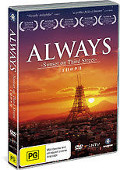
Japan 2005
Directed by
Takashi Yamazaki
133 minutes
Rated PG
Reviewed by
Bernard Hemingway


Always Sunset On Third Street
Winner of twelve of the thirteen awards offered in Japan’s version of the Oscars and the winner of the Audience Choice award at the 2006 New York Asian Film Festival, Always Sunset on Third Street is a bitter-sweet feel-good film which unabashedly aims to ingratiate itself but is so well-made and ingenuously charming to please all but the staunchest of dyspeptics.Set in 1958 Tokyo, it is a marvellously effective visual recreation of the times and one of the pleasures of the film is its detailed production design, superbly enhanced by computer-generated effects. The City of Tokyo, and Japan, then just emerging from the shadow of the war, is very much a central motif in the film.
The story itself is set in a run-down part of town and focuses on the lives of a group of neighbours seen through the eyes of Mutsuko, a country girl newly arrived in the big smoke to take what she thinks will be a glamorous job as a secretary but which turns out to be as a solo mechanic in a small garage loftily named Suzuki Auto. Rather than the grand corporation she expected Mutsuko finds herself in the employ of the irascible Mr Suzuki and bunking in his small house along with his wife and nine year old son, Ippei. Across the street from the Suzukis lives Chagawa, a struggling writer who is forced to eke out a living writing children’s adventure stories for a monthly magazine while also running a small candy shop inherited from a dead aunt. Keen to impress newly-arrived dancer-turned-barmaid, Hiromi, Chagawa agrees to look after Junnosuke, an orphan who has been turned out by his mother, an old acquaintance of Hiromi’s. These are the main characters in what is an Ozu-like tale of growing up in post-war Japan.
Despite its cultural specificity, however, its themes - the innocence of youth, nostalgia for the past and the ups and down of the human comedy are universal enough for everyone to be able to enjoy.
Want something different?





